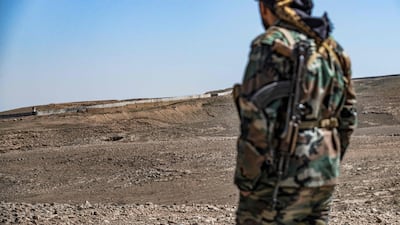The US will allow investment in north-east Syria, parts of the country that are no longer under the control of Bashar Al Assad’s government.
The areas were previously taken by ISIS and then re-taken by Kurdish forces, backed by the US.
The Syrian Democratic Forces, a militia that is Kurdish majority but also has some Syrian Arab membership, still control large parts of Raqqa, Deir Ezzor and Hasakah in the east and north-east of the country.
Syrian President Bashar Al Assad maintains that their presence there is illegal.
Much of this territory was captured from ISIS control, with the SDF advancing under the cover of international coalition air strikes, assisted by a small coalition ground force.
The war left much of the region in ruins and governing war-torn areas formerly under the control of ISIS is a challenge for the Kurds, as they struggle to recover from the conflict and build trust with local Arab communities, while also fending off Turkish incursions in the north of the country, where they have gained control of Kurdish majority areas, including Afrin.
In Marrakech, at a meeting of the global coalition against ISIS, US acting assistant secretary of state Victoria Nuland said Washington would issue a general licence, which frees companies from US sanctions restrictions.
"The United States intends in the next few days to issue a general licence to facilitate private economic investment activity in non-regime-held areas liberated from ISIS in Syria," she said.
The issue of the joint US-Kurdish alliance in eastern Syria became highly contentious under the presidency of Donald Trump, who insisted the US should withdraw from the region.
Mr Trump then changed tack at the end of 2019, saying US forces would remain to “protect the oil”. The US had hoped oil fields, which had been used by ISIS to sustain their operations through black-market smuggling, could be used to stabilise SDF-held areas.
But a diplomat who has discussed the issue extensively with US officials said the licence would apply only to agriculture and reconstruction work, but not to oil.
Turkish-backed Syrian rebel forces also control an adjacent area of northern Syria captured from ISIS.
Ankara regards the SDF as a terrorist group but would not oppose the licence because it covers investment in the area held by the SDF and the area held by groups it supports, the diplomat said.
The United States has imposed tough sanctions on Syria over the government's role in the civil war that has raged since 2011, but it has put money into stabilisation activities in the areas its allies took from ISIS.
Last year it spent $45 million in those areas, Ms Nuland said, telling coalition members that Washington wanted to raise $350 million for stabilisation activities in north-east Syria this year. The United States is seeking a similar amount for Iraq, she said.
She said investment in areas previously held by the militant group was needed to prevent a resurgence of ISIS by allowing it to recruit and exploit local grievances.
Although Washington has issued two previous general licences for Syria, they were for specific materials relating first to publishing and then to Covid-19 supplies, rather than to boost economic activity.








